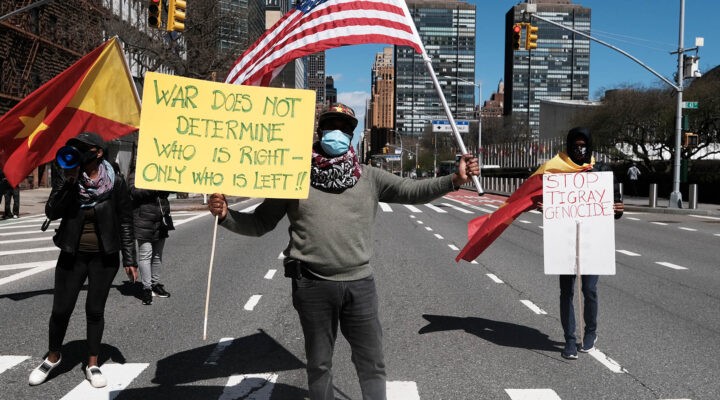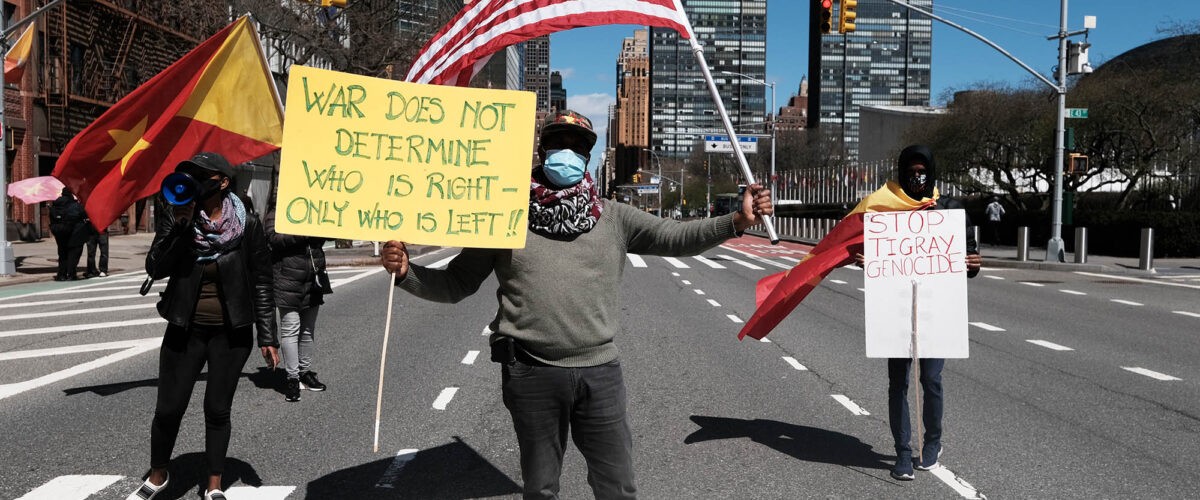As government and rebel forces in Ethiopia advance toward each other and continue to beat the drums of war, concerns continue to pour in from people around the world about the escalating violence and humanitarian disaster in the East African country.
For the umpteenth time in recent decades, an African country is enmeshed in conflict and many observers fear that, unless urgent steps are taken to resolve the issues through dialogue, the conflict could escalate into something worse than already seen.
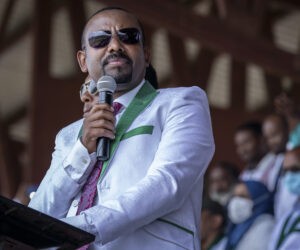
Ethiopia’s Prime Minister Abiy Ahmed speaks at a final campaign rally at a stadium in the town of Jimma in the southwestern Oromia Region of Ethiopia on June 16, 2021. (AP Photo/Mulugeta Ayene, File)
One of the organizations that recently raised its voice on the matter is the Tigray Diaspora Inter-Religious Council, known as TDIRC for short. The body called on Pope Francis to do everything within his power to stop another “Rwanda” in Africa. Rwanda is an East African country that suffered one of the worst disasters in living memory in the mid 1990s when the Tutsi and Hutu people descended on one another and left an estimated 800,000 people dead within four months. The atrocities of the Rwandan genocide, as the conflict has come to be known, are never to be forgotten, thus TDIRC is calling for an end to the Ethiopian violence before it snowballs.
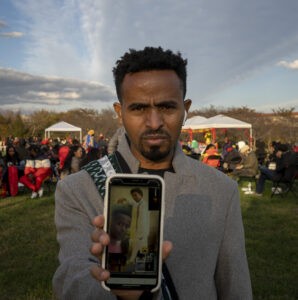
Angesom Mezgebo, displays images of Gebrehiwot Yemane and Haben Sahle Newfie, his two nephews who were killed by Ethiopia Prime Minister Abiy Ahmed’s administration’s attacks in Tigray, the northernmost region in Ethiopia,Thursday, Nov. 4, 2021 in Washington. (AP Photo/Gemunu Amarasinghe)
Prior to the appeal by TDIRC, many church leaders and religious bodies — including the All Africa Conference of Churches — had called for peace, especially over the past year since crisis erupted in Tigray, in the northern part of Ethiopia. There, Abiy Ahmed, Ethiopian prime minister, ordered military action against the Tigray People’s Liberation Front, the ruling party in the region, because of the latter’s seizure of a military base in the area. So far, calls for peace have fallen on deaf ears.
The TDIRC’s urgent call comes amid reports of a worsening humanitarian disaster in Tigray and some other parts of Ethiopia, as well as belligerent postures and victory claims of the opposite camps.
The Tigray People’s Liberation Front, after enduring attacks within its own territory in November, later claimed victory against the government and followed up by launching its own offensive against the government with the aim of taking the battle to Addis Ababa, the seat of government. So far, reports show that the rebels have seized towns like Dessie and Kombolcha, en route to Addis Ababa. In all these, countless lives have been lost while hundreds of thousands of people have been displaced from their homes, according to aid and human rights agencies.
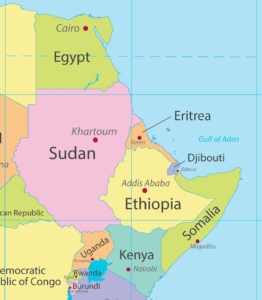
(Bigstockphoto)
It’s a scene that should worry anyone familiar with Africa’s so called revolutionary wars. The Liberian civil war, described by one observer as the crudest war in modern times, began that way. Initiated by Charles Taylor, a former Liberian government employee, the conflict began as a bush war that led to the raiding of communities and towns. It lasted intermittently over 14 years, led to the death of an estimated 250,000 Liberians and created one of the worst humanitarian disasters ever in the region.
Now, amid concerns about the deteriorating situation in Ethiopia, Prime Minister Ahmed chose to join his troops on the war front. A week after landing there, the Ethiopian leader declared that the enemy had been defeated. He urged Tigray People’s Liberation Front to surrender. But they, seeking independence for people of the Tigray region, disputed the claim of Ahmed’s victory, calling it “farcical.”
Why have all peace efforts by mediators failed to prevent the current situation? Previously, both the Tigray People’s Liberation Front and the Ahmed administration claimed ignorance of peace efforts by Ugandan President Yoweri Museveni and former Nigerian President Olusegun Obasanjo. Their attempted mediations came to nothing.
Yet it is never too late to embrace peace, according to Ambassador Jeffrey Feltman, U.S. special envoy for the Horn of Africa in a speech given last month.
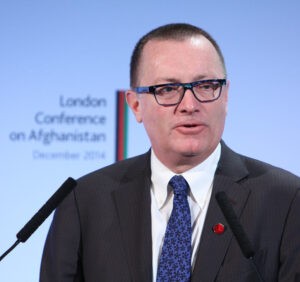
Jeffrey Feltman
“A multi-decade civil war in Ethiopia would be disastrous for its future and its people,” he said. “We urge the government of Ethiopia to give peace a chance, to choose a different path and engage in dialogue without preconditions.”
That could be accomplished through the work of intermediaries such as Obasanjo in his role as African Union High Representative, he said. However it is done, the government of Ethiopia and the Tigray People’s Liberation Front should commence at once with negotiating and implement a series of parallel steps that will stop the violence, allow life-saving access to Tigray, lead to the Tigray People’s Liberation Front withdrawal from Afar and Amhara and the withdrawal of Eritrean forces from Ethiopian territory.
A durable ceasefire is needed, as well as accountability for human rights abuses and any war crimes,” Feltman said. “Ethiopians can set an agenda for talks on issues, including internal border disputes and the role of the central government versus the federal states, that must be resolved peacefully and constitutionally rather than through violence. There are many reciprocal steps the parties could take to move toward a negotiated ceasefire. The first step, though, is demonstrating an openness to try.”
Feltman also denied in his speech that the U.S. shows a bias toward the Tigray People’s Liberation Front.
“Some critics of U.S. policy claim the United States has an inherent bias toward the TPLF. This could not be further from the truth. We have consistently condemned the TPLF’s expansion of the war outside of Tigray and continue to call on the TPLF to withdraw from Afar and Amhara.”
The U.S. “seeks a relationship with all people in Ethiopia,” the envoy said. “We want to see stability and prosperity restored to the entire country and for Ethiopia to regain its position as a regional and global leader. Such an outcome requires Ethiopia’s leaders to put down their guns and find a formula for peaceful co-existence.”
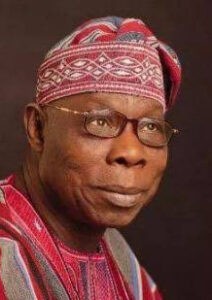
Obasanjo
Despite the setbacks already experienced and failure to halt the descent to anarchy, Obasanjo of the African Union remains convinced that good reason will prevail among the warheads.
“I am optimistic that common ground toward a peaceful resolution of the conflict can be secured,” he said. “The interlocutors I have engaged on all sides have stated their wish for peace, security and stability in Ethiopia. The main point of difference between the actors is in the means by which they seek to achieve this essential objective. War represents a failure of politics.”
Dialogue is the only reliable and sustainable avenue to peace, Obasanjo added. “There is no military solution to the conflict, and battlefield victory cannot guarantee political stability in Ethiopia. I, therefore, appeal to the leadership of all sides to halt their military offensives. This will allow an opportunity for dialogue to continue to progress. Such talks cannot deliver in an environment of escalated military hostilities.”
The former Nigerian military and civilian head of state further called “on all people of goodwill and leaders in Africa and the international community to continue to support our mediation efforts and to refrain from actions or rhetoric that will, wittingly or unwittingly, worsen the conflict.”
Meanwhile, the humanitarian situation in Ethiopia escalates. The latest statistics from the United Nations in early December show an estimated 9.4 million people in need of food assistance across northern Ethiopia “due to the ongoing conflict.”
Anthony Akaeze is a Nigerian-born freelance journalist who currently lives in Houston. He covers Africa for BNG.
Related articles:
In Nigeria, the politics of religion and the search for peace are never-ending

